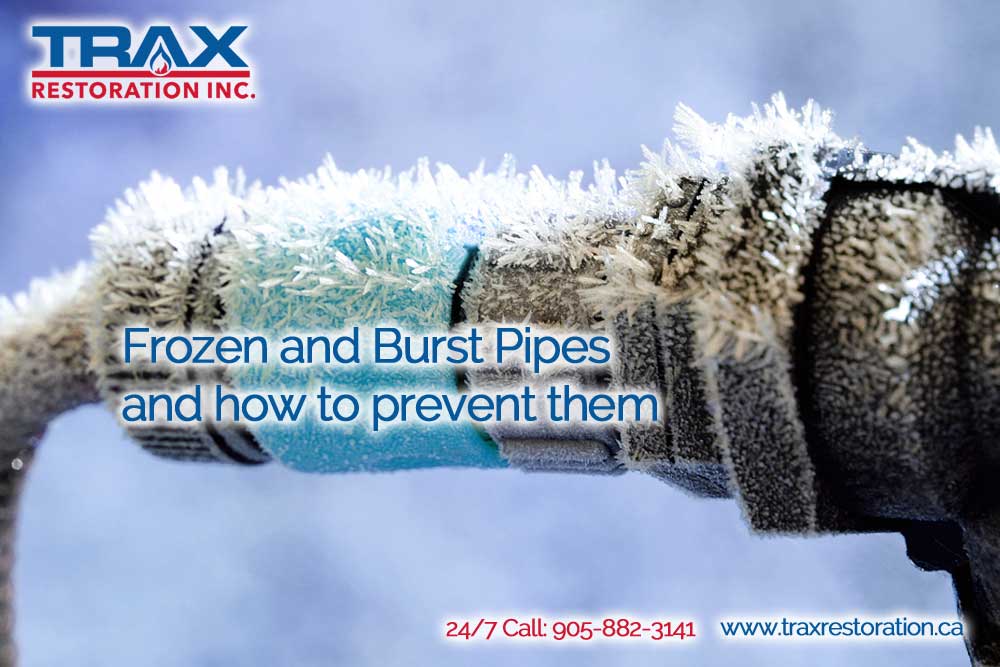It’s FREEZING outside! You may feel warm inside your house or business but your pipes are at risk of freezing. Worse yet, frozen pipes can crack and turn into burst pipes when they warm up, causing a flooded basement and on going water damage.
When the water in your pipes freezes it turns to ice, and as we know ice expands. This causes internal pressure on the pipes and often they’ll crack under that pressure. Small cracks in your pipes leak water behind your walls, floors and ceilings that can cause rot and mold to grow. Overtime, they become burst pipes and water floods your basement.
When this happens you’ll need to safely remove the water together with any mold, repair the damaged pipes, disinfect and dry out the damaged spaces, and your belongings. It can be a difficult job. Fortunately, professional water damage restoration companies are equipped to pump out the water, clean, disinfect and most importantly thoroughly dry out your space safely.
If you turn your taps on and water doesn’t come out then you are at serious risk of burst pipes. It is important to act quickly. Call an emergency plumber.
Here are some things you should do while waiting for an emergency plumber:
- Close the main water shut-off valve that supplies water to your internal plumbing.
- Drain remaining water in your pipes by turning on a cold-water tap in the basement or kitchen if that’s the lowest point available in the house.
- Turn the heat up in your house if you can.
- Open the kitchen, bathroom and laundry room cabinets to let the warm air circulate around the plumbing.
- Keep your garage doors closed if there are water supply lines in the garage.
Tips to Prevent Frozen Pipes:
- Know where your water shut-off valve is located.
- Inform your tenants and other members of the household or business where to locate the shut-off valve and how to shut it off.
- Keep a flashlight near the water shut-off valve in case your electrical power if off.
- Seal off air leaks to prevent to cold air from entering around your windows and doors, dryer vents, water heater and electrical wiring
- Use foam pipe covers to insulate the pipes near the outside walls, in the attic, crawl spaces and garage.
- Turn off the outside water supply, let the taps drain and unscrew hoses
- Run a pencil-thin stream of water in the lowest point of the house like a laundry room tub or sink to prevent the water inside the pipes from freezing
Tips on How to Thaw Frozen Pipes in your Home or Commercial Property
- Close the water shut-off valve
- Turn the cold-water faucet on preferably in the basement
- Try to determine where the pipe is frozen, by checking the location where the water service pipe enters the home and the pipes resting against the exterior walls.
- Apply heat to the frozen pipe by warming the air around it
- Apply heat directly to the pipe using an electric heating pad, warm towel, hair dryer, or a space heater
- Do no use kerosene or propane heaters, charcoal stoves or any open flame like a welding flame torch to thaw a frozen pipe.
- Never leave an electrical heating device on and unattended
- Thawing might take several hours depending on the outside temperatures
- Once the pipes have thawed turn the water back on slowly.
- Check for pipe cracks and leaks by listening for water sounds behind walls and signs of water leaks on the floors or ceilings.
If you suspect that your pipes have cracked call a licensed emergency plumber immediately.
Serving Toronto, Richmond Hill, Markham, Vaughan, Thornhill, Aurora, Maple & surrounding areas.
Trax Restoration Inc. has licensed plumbers available 24 Hours a day, 7 days a week. They are always ready to take your call at 905-882-3141

